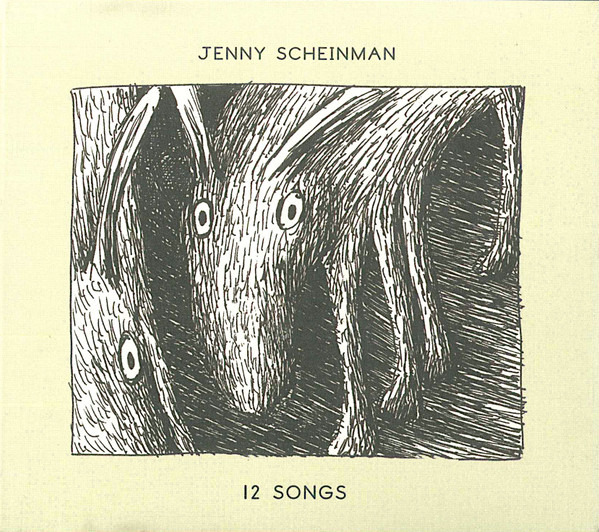
12 Songs (Cryptogramophone)
Jenny Scheinman
Released September 25, 2005
New York Times Best Jazz Albums of 2005
YouTube:
https://music.youtube.com/playlist?list=OLAK5uy_lXYTQ24Dt5mnvhnjF1eux70WJqiUWpZTg
Spotify:
About:
On her fourth CD as a leader violinist Jenny Scheinman fronts a septet including guitarist Bill Frisell and trumpeter Ron Miles. Timeless yet wholly contemporary, and with a sonic palette that’s as fresh as it is familiar. Filled with selfless performances from a group of players with nothing to prove, 12 Songs represents a significant milestone in a career already filled with high points.
“12 Songs maintains an aura of wistful lyricism and dreamy self-reflection, not unlike the music of (Norah) Jones. But the songs are structurally diverse.”
The New York Times
Track Listing:
1. The Frog Threw His Head Back and Laughed (Jenny Scheinman) 06:09
2. Song of the Open Road (Jenny Scheinman) 05:00
3. Moe Hawk (Jenny Scheinman) 06:36
4. Sleeping in the Aquifer (Jenny Scheinman) 03:16
5. The Bouy Song (Jenny Scheinman) 04:39
6. She Couldn’t Beleive It Was True (Jenny Scheinman) 03:58
7. Suza (Jenny Scheinman) 05:23
8. Little Calypso (Jenny Scheinman) 02:59
9. Satelite (Jenny Scheinman) 01:56
10. Antenna (Jenny Scheinman) 07:31
11. Albert (Jenny Scheinman) 03:27
12. June 21 (Jenny Scheinman) 04:32
Personnel:
Jenny Scheinman: violin
Ron Miles: cornet
Doug Weselman: clarinets
Bill Frisell: guitar (3)
Rachelle Garniez: accordion, piano, claviola
Tim Luntzel: bass (5, 6, 8)
Don Reiser: drums
Recorded December 13 & 14, 2004 at Systems Two Studios, Brooklyn, New York.
Produced by Jenny Scheinman and Sascha Von Oertzen
Executive-Producer: Jeff Gauthier
Art from Sing by Molly Barker © 1994
Recorded and Mixed by Sascha Von Oertzen
Assistant Engineer: Alan Ford
Mastered by Rich Breen
Designby Andrew Nofsinger
Review:
From the opening notes of 12 Songs, it becomes clear why Jenny Scheinman has been guitarist Bill Frisell’s violinist of choice for the past couple of years. It’s more than being a good player—although she’s very, very good. It’s more about a shared sensibility that allows for liberal cross-pollination of genres, and a less-is-more approach to soloing—that is, when there even is soloing. For Scheinman, like Frisell, the song’s the thing. And while both players are more than capable of extended improvisation, they prefer to create the kind of musical canvas that relies on free interpretation of a strong melody and group interaction, rather than discrete flights of fancy.
Having played on recent Frisell albums including 2003’s The Intercontinentals, 2004’s Unspeakable, and this year’s Richter 858, it’s no surprise that Scheinman has enlisted the guitarist’s unmistakable voice for 12 Songs. Frisell’s relaxed phrasing, rich tone, and quirky sense of humour are in perfect keeping with Scheinman’s own lush sound and unhurried approach.
Joining Scheinman and Frisell are cornetist Ron Miles (another Frisell collaborator), clarinetist Doug Wieselman, keyboard/accordionist Rachelle Garniez, bassist Tim Luntzel, and drummer Dan Reiser. You’d think that twelve songs with a septet would run the risk of becoming cluttered, but it’s actually rare that all seven players are in the pool at the same time. Instead, Scheinman views them as colors on her sonic palette, using a splash of one here, a lick of another there.
There are conceptual links to Scheinman’s last album, 2004’s Shalagaster, but despite the occasional nod to music from farther abroad, 12 Songs is an unrepentantly American record. Still, filtered through Scheinman’s strangely coloured lens, the music has the same kind of off-kilter unpredictability so prevalent in Frisell’s work. Scheinman’s writing comes from many times, while remaining completely timeless, ranging from the heartlands of “The Buoy Song to the gentle Aaron Copland-informed introduction to “She Couldn’t Believe It Was True, which ultimately evolves into a curious link between a Celtic-cum-bluegrass theme and Jewish hora rhythm.
On the other hand, Scheinman’s use of stylistic interconnections and the way she blends instruments is completely modern. The folkloric changes of “June 21 may feel familiar, but her blend of violin, clarinet, and cornet to create long, slow phrases beneath Frisell’s slow-hand meanderings creates its own understated innovation. Scheinman’s effective arrangements make for an intriguing house of cards. In many cases individual instruments don’t appear to be essential, yet remove one and her carefully crafted sound would fall apart.
These appropriately titled 12 Songs may provide some solo space, but at the end of the day they’re really compositional vignettes evocative of specific times, places, and emotions—another clear nexus point for Scheinman and Frisell. It would be easy to suggest she’s been influenced by Frisell, but the truth is much deeper. Scheinman’s voice was already well-formed before encountering Frisell, and 12 Songs is more a serendipitous case of two artists discovering they share a common space with common goals.
John Kelman (All About Jazz)





